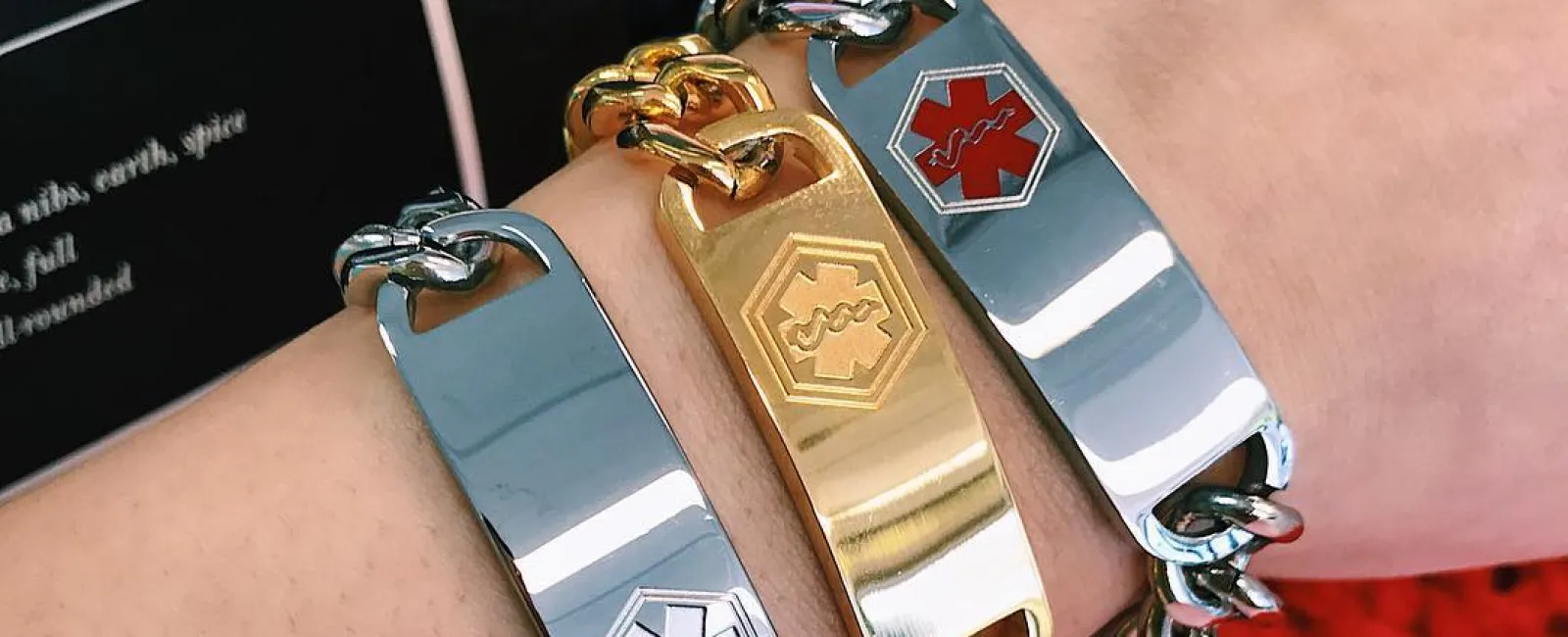According to the National Emergency Number Association (NENA), more than 240 million calls are made to 911 seeking emergency assistance each year in the United States. Many of these calls are for emergency health and medical assistance for Americans of all ages. In these situations, an important device called a medical alert bracelet could save precious time and make all the difference for someone with life-threatening allergies or medical conditions.
What is a medical alert bracelet?
A medical alert bracelet is a piece of jewelry (bracelet or necklace) that you wear at all times. It provides critical health information to bystanders and medical personnel during a medical emergency should you be incapacitated or unable to speak for yourself.
Medical alert bracelets are designed for people who:
- Have severe or advanced medical conditions
- Suffer from food or environmental allergies
- Are more likely to trip or fall
- Have difficulty moving around unassisted
- Require assistance with daily activities like bathing or cooking
In this blog, we'll outline the information you should include on your medical alert bracelet to ensure fast, adequate medical care in an emergency, including:
- Your name and emergency contact information
- Your medical condition(s)
- Your medications
In Atlanta, Ackerman Security is the leader in personal medical monitoring, home security and protection, and smart home automation. Find out how we can help you protect what matters most. Give us a call at 800.552.1111 or schedule your free instant security quote today. We've got you covered.
Your name and emergency contact information
It's essential to include your first and last name on your medical alert bracelet so you can be identified easily. Your name makes it easier for medical personnel to care for you and to identify your family or next of kin in an emergency. The information on your medical alert bracelet should be in large font and easy to read. If you don't want your name visible to everyone as you walk around every day, consider putting it on the back of your bracelet, or the side that sits against your skin.
It is not necessary to put an address or phone number on your bracelet. The exception to this would be for someone with a condition like Alzheimer's or dementia. In this case, it is recommended to include this information in case they wander or get lost.
You also don't need to include personal identifying information like your social security number or date of birth. Allowing strangers to have access to this information unnecessarily could result in identity theft.
In some emergencies, you may be alert and conscious, but the people helping you may need to contact your family for you. For this reason, be sure to include an emergency contact on your medical alert bracelet. Use the abbreviation ICE, which stands for "in case of emergency." You can typically include the name and best contact phone number for one to two emergency contacts. Be sure to let these people know they are your emergency contacts and ask them to make sure that they will pick up the phone if called.
Your medical condition(s)
On your medical alert bracelet, include any medical conditions you have been diagnosed with that could leave you unconscious or unable to communicate. This will give an emergency responder more information to better assess your health if you are injured or unable to respond. It will also help emergency personnel better understand any symptoms you may be experiencing and help determine how to treat you properly.
Some examples of common conditions listed include asthma, diabetes, high blood pressure, cancer, heart disease, or sickle cell anemia.
Since there isn't a lot of room on your medical alert bracelet, using abbreviations helps get all of the important information in one place.
Common medical abbreviations include:
Alzheimer's: ALZ
Atrial fibrillation: A-Fib
Ventricular fibrillation: V-Fib
Heart tachycardia: Tacy
Blood pressure: BP
Hypertension: HTN
Cancer: CA
Type 1 diabetes: DM1
Type 2 diabetes: DM2
Insulin-dependent diabetes: IDDM
Cardiovascular disease: CV
Gastrointestinal disease: GI
Transplant recipient (organ name): TX
Cystic fibrosis: CF
Your medications
Any medications or allergies to a medication should be clearly listed on the front of your medical alert bracelet. This information is vital for first responders, especially if the medications you're taking have potentially dangerous interactions, side effects, or risks. For example, if you're taking blood thinners, a first responder will be more aware of possible risks, such as internal bleeding, in the event of a serious injury.
As with medical conditions, medications can be abbreviated on your bracelet to save space.
Common medication abbreviations include:
Epinephrine pen(auto-injector): EPI-pen
Epinephrine: EPI
Blood thinners: ON BLOOD THINNERS
Sulfa drugs: SULFA
Allergies to sulfa drugs: NO SULFA
Aspirin: ASA
Tetracycline: TCN
Other important medical information can be included on your medical alert bracelet, such as:
- Allergies to medications or foods.
- Your blood type. This is especially important for those with immunity or bleeding/ blood disorders.
- Any "Do Not Resuscitate" (DNR) instructions, specifically if you would not like a first responder or bystander to perform CPR.
- Relevant medical implanted devices, like a pacemaker or an insulin pump.
Some common abbreviations for these conditions include:
Allergy to penicillin: NO PCN
Nut allergy: NO NUTS
Allergic to: ALGY
No known allergies: NKA
No known drug allergies: NKDA
Do not resuscitate: DNR/ NO CPR
Give yourself (and your family) the peace of mind of being prepared for a medical emergency. Let Ackerman Security show you how.
Ackerman Security offers best-in-class technology to empower you and your loved ones to maintain independence. All with the comfort of knowing that advanced medical monitoring is watching 24/7. We make sure that help is available with just one touch of a button.
To learn more about personal medical devices, call us today at 800.552.1111 or get your free instant security quote online.






